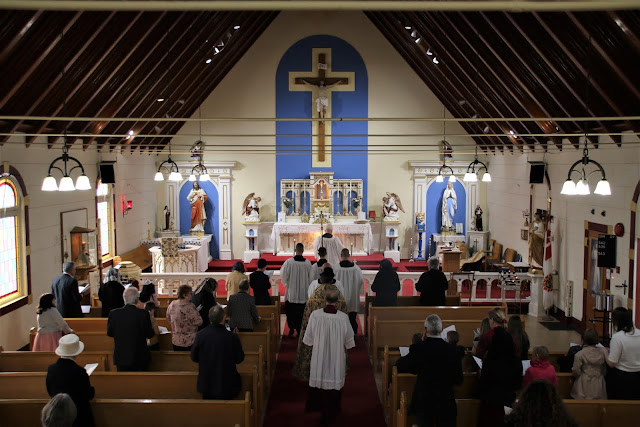An Unofficial Ordinariate Primer: a beginning.
- A chapter in the autobiography of the Holy Ghost?
- The Holy Ghost working in and through the English Christian people, before and after the Tudor split, drawing people (back) to unity in the Church that Christ established, that is, the Catholic Church?
- The Holy Ghost revitalizing the Church by bringing back into the Catholic fold "many elements of sanctification and of truth (...) found outside her visible confines"?
- The grammar of the Holy Ghost organizing those "elements of sanctification and truth" belonging in and to the Catholic Church?
Disclaimer
Admittedly, there are a lot of loose ends in this post left unthreaded, and perhaps some threads that require further untangling in order for the reader to access a culture and way of being Catholic that complements other experiences of being Catholic.
There is no attempt in this post to be comprehensive, nor any attempt to render a verdict as judge and jury, save to expose facts that may prove useful to an exploration and appreciation of the Ordinariate charism. Point of fact: this blogger is no expert on the subject of the Ordinariate. Fortunately, for me, I'm in good company, for those of us so blessed to be members of the Ordinariate are, every day it seems, discovering anew the Anglican Patrimony in communion with the Catholic Church. Certainly, some - many, that is - have a much deeper grasp of the various subjects grouped under the patrimonial umbrella. Deference is due to those learned authors listed and cited.
Knowing something about where Ordinariate Catholics are coming from can tell an interested visitor a great deal about where we, like all Catholics, hope on going and how we hope to get there.
In case you're wondering where that 'there' is, the shorter answer would be the Apostles' Creed, à la the Ordinariate, especially that bit about the Life everlasting.
I BELIEVE in God the Father Almighty, Maker of heaven and earth: And in Jesus Christ his only Son our Lord: Who was conceived by the Holy Ghost, Born of the Virgin Mary: Suffered under Pontius Pilate, Was crucified, dead, and buried: He descended into hell; The third day he rose again from the dead: He ascended into heaven, And sitteth on the right hand of God the Father Almighty: From thence he shall come to Judge the quick and the dead. I believe in the Holy Ghost: The holy Catholic Church; The Communion of Saints: The Forgiveness of sins: The Resurrection of the body: ✠ And the Life everlasting. Amen.The Amen that concludes the Creed speaks to our confident hope that we offer to anyone seeking the True, the Good and the Beautiful. That is, anyone and everyone seeking God.
Hearken also to the words of Jesus recorded in the Holy Gospel according to Saint John:
I am come that they might have life, and that they might have it more abundantly. I am the good shepherd: the good shepherd giveth his life for the sheep.The Baltimore Catechism sums up beautifully our reason for being:
Question: Why did God make you? Answer: God made me to know Him, to love Him, and to serve Him in this world, and to be happy with Him forever in the next.Let us proceed with the happy task of uncovering buried treasure and sharing (Ordinariate) gifts with the wider Church. The name of this blog site is, after all, A Treasure To Be Shared.
READ THE REST AT THE PRIMER PAGE
https://atreasuretobeshared.blogspot.com/p/alpha-and-omega-source-and-summit.html
https://atreasuretobeshared.blogspot.com/p/alpha-and-omega-source-and-summit.html






.png)

Comments
Post a Comment
Your comments will be appreciated and posted if 1) they are on topic and 2) preserve decorum.
Stand by your word.